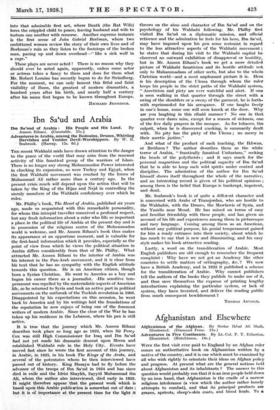Afghanistan and Elsewhere
Adventures in Five Continents. By Lt.-Col. P. T. Etherton. Illustrated. (Hutchinson. 18s.) WITH the first visit ever paid to England by an Afghan ruler comes an authoritative book on Afghanistan written by a native of the country, and it is one which must be examined by all who wish rightly to orientate their ideas on Afghan policy and progress. At present what are the general notions held about Afghanistan and its inhabitants ? The answer to this question would probably run that it is an iron people held down by an iron hand, that Afghanistan is the cradle of a narrow religious intolerance (a view which the author rather lamely attempts to combat), and that its principal products are zrapes, apricots, sheep's-skin coats, and blood feuds. To a aertain extent such a view is correct, but .a perusal of the Sirdar Syed Ikba/ All Shah's fair-minded and informed book will show that it requires considerable modifications and additions.
The Ameer Abdurrhaman Khan once likened Afghanistan to a swan in a pool, on either side. of which stood the Russian wolf and the British tiger both snarling at each other. He prophesied their mutual destruction, but added, "The water is still deep, and inshallah will remain so." Afghanistan is still the swan in the pool, and it is this centrality which invests it with its peculiar interest, but the Anglo-Afghan treaty of 1921 has made one side of the pool safe for the swan, and, on the other "no possible blandishments, political or financial, would prevail with the Ameer to hypothecate his national and sovereign interests to Moscow."
Informative chapters on folk-sayings and the psychological make-up of the country show that the three essential interests of the Afghan are women, liberty, and money. Woman he reverences and is beginning to educate (the forceful personality of the Queen Dowager in the van of progress) ; of liberty he is assured by the rocky fastnesses of his native land and his own straight shooting (now aided by Turkish training on modern lines) ; and of money he has enough for his simple needs. But can the Afghan continue to resist the economic urge of the West ? Can he exclude it, for instance, from the exploitation of the mineral riches the country is said to contain, the development of which, however, depends on the construction of good roads ? (The author might here note, by the way, that on p. 100 he definitely says that Afghanistan possesses no coal, a statement which is contradicted by details of coal deposits given on p. 244.)
Mr. Ikbal All is quite clear that while the aims and lessons of Western civilization will be admitted up to a point, "still they will be turned into channels of Afghan thought and necessity," and indeed it is the intention and policy of the present Ameer that his- country should admit modernization, for it could not retain its independence without it. With this end in view the country is going ahead in various enlightened directions. There is some semblance of representative govern-. ment, but on the whole the regime is one of a beneficent autocracy, tempered by the fanatical teachings of the Mullahs, to whom the present Ameer, however, does not truckle any more than his grandfather did. The present ruler does not, like his predecessors, depend on the vested interests of the nobility, but on the nation, and in traditional Eastern fashion he is fond of going about at night in Kabul streets to examine into the conditions of life of the poorer people. Under his inspiration public education is advancing ; model farms, the telephone, cinema, and wireless have been introduced, and, if the Press is very strictly censored and there are in Afghanistan no banks, there is, at least, no national debt. Some of the materialisms of the West are adopted, but "what must be emphasized is that the culture of the West in its entirety cannot be successfully grafted to the East."
The book, in addition to chapters on the geography, history (an extended history from the author's hind would be very welcome), and folk-lore of the country contains two specially enlightening chapters on Pan-Islainism and the Afghan Conception of Sufism. These there is no space to discuss here, but on the latter the question naturally suggests itself—Is not Sufic mysticism, as presented by the author, a fatal solvent of Islam ? The Koran lays it down that God is perfectly distinct from the world and from the souls of men. Sufism is qualified monism.
It Must have been a mere accident that Colonel Etherton's adventurous career has never taken him into Afghanistan, but this lack is amply compensated by his experience in (bar the Polar regions) almost all the rest of the globe, and they have resulted in a book of very special interest. It is a collection of rattling yams told modestly but full of excitement, which range from gold-mining in British Columbia and life before the mast in a Pacific liner to the Boer War and the checking of opium smuggling on the Roof of the World and Central Asia generally, where as Consul-General and British Political Resident, he was threatened by a Bolshevik general order "Do to death the bloodthirsty Etherton." But he has survived to delight us all with the stirring story of his world- wide adventures. Australians will not like his opinion that their Northern Territory is predestined to be 'settled by' Japanese.











































 Previous page
Previous page